Stay in the know on all smart updates of your favorite topics.
Dutch Applied AI Award 2024 naar Sturgeon, UMC Utrecht en Oncode Institute
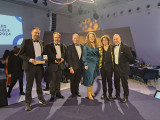
Sturgeon, het AI-initiatief van UMC Utrecht en Oncode Institute is dit jaar de winnaar van de Dutch Applied AI Award 2024. Naast deze award heeft de AI-toepassing ook de Computable Award in de categorie ‘Zorgproject’ gewonnen.
In verkorte tijd het type hersentumor bepalen met behulp van AI
Dankzij de inzet van AI kunnen neurochirurgen sneller bepalen met welk type hersentumor zij te maken hebben. De technologie vermindert de tijd die nodig is voor het stellen van een diagnose, van dagen naar ongeveer drie kwartier. Een behandelplan kan hierdoor sneller worden opgesteld. De technologie is ontwikkeld door de onderzoeksgroep van biomedicus Jeroen de Ridder van UMC Utrecht en Oncode Institute. Het algoritme dat het type hersentumor moet bepalen is getraind op miljoenen onvolledige datavoorbeelden van verschillende typen tumoren. Sturgeon is publiek beschikbaar en het wordt inmiddels ook ingezet in het Máxima Kinderziekenhuis voor het diagnosticeren van kinderkanker.
Jury prijst complexiteit van de technologie
De jury van de Dutch Applied AI Award heeft bewondering voor de toepassing. “Dit jaar een AI-toepassing in de medische sector, in het bijzonder voor de snelle herkenning van hersentumoren, wat voor zowel patiënt als chirurg een enorme impact heeft. Ze waren met de technologie van Sturgeon in staat om een model te ontwikkelen dat uit een minimale hoeveelheid pixels een accurate diagnose kan stellen, en dat in ongeveer drie kwartier tijd”. Aldus Nanda Piersma, jurylid van de Dutch Applied AI Award.
Het is de vijfde keer dat de Dutch Applied AI Award werd uitgereikt. Dit jaar in de jury:
· Nanda Piersma (Hogeschool van Amsterdam)
· Anouk Dutreé (De Dataloog & UbiOps)
· Omar Niamut (Hogeschool van Amsterdam & TNO)
· Maaike Harbers (Hogeschool Rotterdam)
· Jann de Waal (Topsector Creatieve Industrie)
· Sander Hulsman (Jaarbeurs Utrecht)
Over de Dutch Applied AI Award
Data Dilemmas Recap: Using Data and AI for an Accessible Amsterdam
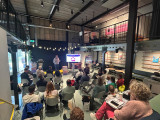
On September 26th, our community gathered in the AHK Culture Club at Marineterrein Amsterdam for our Datadilemma’s series. This edition focused on the use of Data and AI to create a more accessible Amsterdam. This article presents some of the key highlights and insights from the afternoon.
Together with the three speakers, Vishruth Krishnan, Hans Voerknecht, Michiel Bontenbal, and our audience we discussed how data and AI can help make our city more accessible for all. Which dilemma’s do we encounter when we use new technologies for an accessible city? How can data help to get more understanding of unequal access to mobility in the country? And what about sounds and noise pollution; how can data help make te city more livable?
What the three speakers had in common; a personal motivation to get away from the surface and dive deeper into the data, attempting to get closer to people’s experiences and perceptions. From an ordinary routeplanner, to one paying specific attention to challenges for people in weelchairs. From generic accesibility data for the region, to data highlighting the unequal distribution of access to mobility. And from recording noise levels, to measuring and classifying all different sounds in urban settings. In the paragraphs below, I will delve deeper into the different speakers and their topics.
Visruth Krishnan – Personalized Route Planner for People in a Wheelchair
To help individuals with limited mobility navigate the city more easily, the city’s innovation department has developed a prototype route planning tool. This route planner maps out the most accessible routes based on personal needs, considering preferences like maximum curb height at crossings, minimum sidewalk width, and whether to prioritize sidewalks or bike paths.
Visruth Krishnan, Data Scientist at the Innovation Department of the Municipality of Amsterdam, explained how data helps facilitate travel from point A to point B. However, to ensure route planning tools address the challenges faced by wheelchair users, we must feed these systems with data drawn from real-world experiences. A person’s journey might present specific challenges, such as detours, improperly parked bicycles, slopes, and narrow footpaths.
Working with a group of wheelchair users, Visruth studied the obstacles and experiences they encountered on their routes. This research generated precise data to feed the route planner, enabling it to provide personalized route suggestions that account for each individual’s freedom of movement.
Visruth presented several dilemmas encountered during the project:
- Subjectivity in the data: How busy is a sidewalk or intersection perceived to be? Are cyclists at a certain point fast and aggressive, or is that just a feeling?
- Minimal vs. comprehensive data collection: How much data should be gathered? While more data might provide deeper insights, it could also increase privacy risks.
- Accurate vs. timely data: Timely data may not always be accurate, and accurate data may not always be available in time for critical decision-making. Consider issues like illegally parked bikes, construction work, and terraces that vary in size and location depending on the season.
- Transparency vs. complexity: How transparent should data-driven processes be, especially when the algorithms or analytics behind them are complex? AI is often seen as a "black box"—people don’t understand how it works or how data is processed, which can lead to less trust from the start.
To address these challenges, Visruth and his team maintain an ongoing dialogue with the target audience. It’s an iterative process, and they keep the ‘human in the loop.’ The prototype is now ready, and hopefully, it can be further developed!
Hans Voerknecht – Unequal Accesibility and Data to Support The Narrative
Hans Voerknecht, strategist for sustainable accessibility at Een Nieuwe Kijk, presented the Integrated Perspective on Accessibility method, which he developed to get a deeper understanding of people’s accessibility. This method assists in collecting data and analyzing the severity of current inequalities and the effects of policy measures. The method has already been applied in nearly twenty projects, including four in the Amsterdam region, such as the Multimodal Future Vision of the Metropoolregio Amsterdam (MRA).
IKOB stands for "Integrale Kijk Op Bereikbaarheid" (Integrated Perspective/view on Accessibility). IKOB examines the travel time and costs that people face to reach their workplace by bike, car, or public transport and it visualizes how many jobs people can access from a specific area.
IKOB uses 'distance decay curves<strong>,'</strong> meaning that jobs located closer are given more weight than those further away. Travel time and costs are adjusted depending on the target group. Factors considered include income, access to a car, travel cost reimbursement, public transport options, and preference for a mode of transport (car, public transport, or bike). For people with a lower income, costs weigh more heavily than for those with higher incomes.
Throughout his talk, Hans discussed how data can be used to support a narrative, either consciously or unconsciously. Regional research on the state of mobility can quickly paint a positive picture if you're working with averages and fail to examine differences between people. There are groups that experience less access to mobility, and for whom this issue carries more weight due to financial constraints. The way data is researched and how deeply you investigate determines to what extent this group and their challenges are brought into focus.
One of the dilemmas Hans mentioned was the fact that poor accessibility is a personal experience. It’s subjective, and there can be a lot behind it. Regardless of the detail and quality of your data, you can never be completely sure if it truly reflects the human experience it’s supposed to represent.
Michiel Bontenbal – The Urban Sounds Sensor
Our third and final speaker discussed sounds and noise pollution in an urban environment. It may not seem to immediately fit with the rest of the speakers, but urban sound is also important to consider when creating an accessible and liveable city. Michiel Bontenbal, lecturer in business and IT courses at the Amsterdam University of Applied Sciences, told us more about the Urban Sounds sensor, developed in collaboration with the volunteer organization Sensemakers. He explained us more about the challenges they face with this AI-driven solution and raised some dilemmas in his work.
The Urban Sounds Sensor project was developed in response to the need for evidence of nighttime noise disturbances. It was crucial to be able to distinguish between different types of sounds, such as music, mopeds, alarms, doors, car noises, and honking.
Together with the volunteers from Sensemakers, Michiel designed the sensor in such a way that the recorded sounds are neither stored nor released. The microphone registers the sound, and the algorithm in the sensor immediately categorizes it within the device. This approach ensures privacy by design.
Training the sensor is still an ongoing process. Achieving high accuracy is challenging, as even humans sometimes have trouble identifying certain sounds. And, while measuring noise disturbances is definitely getting more attention in the city now. However, this specific method of distinguishing between sound categories is still lagging behind in both development and interest from government authorities.
Michiel concluded his presentation by discussing his dilemmas with the audience. One of his dilemmas, as expected, was about placing microphones in public spaces; how desirable is that, really? It's important to talk about ethics and privacy when measuring in public spaces, especially with a sound sensor that isn’t visible. His second point focused on the experience of city sounds. How you perceive sounds depends on personal experiences and preferences. Some people enjoy urban sounds, like the noise of a tram or ringing bike bells. People may have associations with certain sounds that determine whether they find them annoying, don't even notice them, or actually enjoy them. This is a factor that a sound sensor and the data it collects have difficulty accounting for.
Panel Discussion
After the presentations, we brought the speakers together for a panel discussion. Led by Chris de Veer, programme manager Mobility at Amsterdam InChange, there was an engaging conversation with the audience. To wrap things up, I’d like to highlight three key statements made by the speakers in response to some critical questions from the audience:
- "We often try to objectify the world with data, but there is no objective truth. However, diving deep into data can give you a better and more diverse understanding of an issue or region." – Hans
- "Data is always messy. If the data we input is messy, the outcome will also be messy. Garbage in, garbage out." – Michiel
- “The Route Planner method and platform could be of great use in gaining a better overview of building accessibility throughout the city.” - Visruth
Thanks to the speakers for their stories and to the audience for the lively discussions afterwards. Want to join us for our next Data Dilemmas event? The next edition of this series of open events will be announced soon. We’re also always open to new themes and topics for this series; we’re curious to hear about the data dilemmas you encounter in your work!
Wie maakt kans op de Dutch Applied AI Award 2024?

Na topoverleg van de jury maken drie initiatieven kans op de Dutch Applied AI Award. Het is voor de vijfde keer op rij dat deze prijs tijdens de Computable Awards in november wordt uitgereikt. Met de award belonen het Centre of Expertise Applied AI van de Hogeschool van Amsterdam, ICT-platform Computable en podcast De Dataloog een vernieuwend initiatief op het gebied van toegepaste Artificiële Intelligentie.
We feliciteren de volgende genomineerden:
Wie er uiteindelijk met de award vandoor gaat, wordt bekend op woensdagavond 27 november 2024 tijdens de uitreiking van de Computable Awards in Utrecht. De jury - bestaande uit zes experts op het gebied van Applied AI - heeft de genomineerden geselecteerd op drie criteria:
Applied AI - in hoeverre is de oplossing al geïmplementeerd, wordt het gebruikt door de beoogde doelgroep en hoe groot is het aantal (potentiële) klanten/het aantal mensen dat met deze innovatie direct of indirect wordt geholpen.
Uniekheid - in hoeverre is de innovatie de enige in haar soort, is het nooit eerder op de markt gebracht en kan het doel van de innovatie niet op een andere manier worden behaald.
Responsible AI (transparantie, privacy, fairness, etc.) - in hoeverre is het ontworpen of gebruikte AI-algoritme transparant. Stelt het de gebruiker in staat om verantwoording af te leggen en duidelijk te zijn over de factoren die de algoritmische beslissingen beïnvloeden.
Dit jaar in de jury:
Nanda Piersma | Hogeschool van Amsterdam | Wetenschappelijk directeur Centre of Expertise Applied AI
Jurjen Helmus | Hogeschool van Amsterdam | Coördinator Smart Asset Management Lab | Eigenaar De Dataloog
Omar Niamut | TNO | Director of Science
Maaike Harbers | Hogeschool Rotterdam | Lector AI & Society
Jann de Waal | Topsector Creatieve Industrie | Voorzitter | Oprichter INFO
Sander Hulsman | Jaarbeurs Utrecht | Chief Digital Content
Nomineer jouw AI-toepassing voor de Dutch Applied AI Award

Heb of ken jij een vernieuwend initiatief op het gebied van toegepaste Artificiële Intelligentie? Nomineer deze toepassing dan voor de Dutch Applied AI Award!
Het is dit jaar voor de vijfde keer dat deze juryprijs tijdens de jaarlijkse Computable Awards wordt uitgereikt. Sinds 2020 beloont het Centre of Expertise Applied AI van de Hogeschool van Amsterdam samen met ICT-platform Computable en podcast De Dataloog een innovatieve AI-toepassing.
Daarbij beoordeelt de jury - bestaande uit vijf experts op het gebied van Applied AI - alle inzendingen op drie criteria:
- Applied AI - in hoeverre is de oplossing al geïmplementeerd, wordt het gebruikt door de beoogde doelgroep en hoe groot is het aantal (potentiële) klanten/het aantal mensen dat met deze innovatie direct of indirect wordt geholpen.
- Uniekheid - in hoeverre is de innovatie de enige in haar soort, is het nooit eerder op de markt gebracht en kan het doel van de innovatie niet op een andere manier worden behaald.
- Responsible AI (transparantie, privacy, fairness, etc.) - in hoeverre is het ontworpen of gebruikte AI-algoritme transparant. Stelt het de gebruiker in staat om verantwoording af te leggen en duidelijk te zijn over de factoren die de algoritmische beslissingen beïnvloeden.
Je kunt een initiatief tot maandag 1 juli voordragen via deze link .
Uit alle inzendingen maakt de jury een top 3. De top 3 wordt op dinsdag 12 november uitgenodigd op de Hogeschool van Amsterdam om zijn innovatieve AI-toepassing te pitchen. De winnaar wordt op donderdag 28 november verkozen tijdens de uitreiking van de Computable Awards in de Jaarbeurs Utrecht.
Eerdere winnaars:
'Eerlijk data delen start met goede compliance' – Sander Klous (KPMG)

Het delen van data is een belangrijke motor voor vooruitgang in de samenleving. Ook als die informatie gevoelig is voor privacy en concurrentie. AMdEX, een initiatief van Amsterdam Economic Board en partners, ontwikkelt een manier om data veilig en verantwoord te kunnen delen, met behoud van controle voor data-eigenaars.
Sander Klous (KPMG) is een van de partners die het team achter AMdEX ondersteunen. Dit team werkt aan de ontwikkeling van een 'digitale notaris', die contracten levert aan organisaties die data willen delen. Ook dwingt AMdEX de voorwaarden hierin juridisch af. De contracten ondersteunen eenvoudige datatransacties tussen twee organisaties. Maar ook complexe AI-algoritmen, die toegang moeten hebben tot data die op meerdere plekken is opgeslagen.
Wetten en regels
“Momenteel zijn er geen goede mechanismen om de naleving van de vele regels en voorschriften rond data en AI af te dwingen of zelfs maar te controleren”, zegt Sander Klous. “In andere regelgevingsdomeinen stellen bedrijven als KPMG, als onafhankelijke derde partij, organisaties in staat om hun compliance aan te tonen via een auditproces. Helaas is dit proces ingewikkeld wanneer het gaat om data en AI."
Lees het complete interview met Sander Klous om meer te weten over het belang van eerlijk en veilig data delen.
Zeno AI wins Dutch Applied AI Award 2022
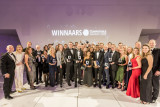
Zeno AI was awarded a Dutch Applied AI Award on Wednesday evening, 5 October. WSK Medical's technology helps ENT doctors detect throat cancer in patients at an early stage. This is done during an endoscopy, with Artificial Intelligence providing instant analysis. A great example of humans and technology working together.
The Dutch Applied AI Award is a jury prize and was presented for the third time during the annual Computable Awards. The award, which rewards AI innovations, is an initiative of Computable (the platform for ICT professionals), De Dataloog (the Dutch podcast on data and AI) and the Centre of Expertise Applied Artificial Intelligence of Amsterdam University of Applied Sciences. DEARhealth (2020) and BAM Infra Asset Management (2021) preceded Zeno AI as winners.
IMAGE RECOGNITION ON THROAT CANCER VALUABLE
According to jury president Nanda Piersma, doctors are very happy with the application of WSK Medical. The application of image recognition to throat cancer works and is valuable. ‘The technique has reached a new group of users. ENT doctors have adopted Zeno AI in their daily work. That makes the application unique’, said Piersma, who is scientific director at the Centre of Expertise Applied Artificial Intelligence. ‘In addition, the technology is transparent and user-friendly. We look forward to its further development, so that larger target groups are reached and new AI techniques emerge in this specialism.’
SUPPORT FOR CORRECT DECISIONS
Radboudumc in Nijmegen is the first hospital to use Zeno AI at its outpatient clinic. The AI application immediately starts analysing as soon as an ENT doctor turns on the endoscope. As a result, using Zeno AI can reduce the time to diagnosis from two/three weeks (average waiting time) to the same day. Faster diagnosis of throat cancer enables a faster care plan for patients. Importantly, the technology only makes predictions based on knowledge and thus does not diagnose. Zeno AI supports the ENT doctor in making the right decision, for example when it is not immediately clear what is going on.
Zeno AI is currently going through the process of CE marking (MDR). This assesses not only clinical validation, but in particular the technical architecture and design, as well as traceability and risk management.
ENGINE OF INNOVATION
The Dutch Applied AI Award jury noticed that there is considerable innovation in the techniques behind Artificial Intelligence, creating interesting new applications. Piersma: ‘We see well-developed applications for specialist sectors this year, as well as applications with a broad societal impact.’
The award criteria on which the jury selects focus on the level of application, transparency, and uniqueness of its kind. An AI initiative additionally scores highly if a user is involved in the application. ‘The AI must really add value’, says Piersma. ‘With the Dutch Applied AI Award, we want to actively encourage innovation, so that applications arise that otherwise would not come to fruition.’
The winning 2022 initiative also lands in a nice AI ecosystem - the AI hub Amsterdam - in which Amsterdam University of Applied Sciences participates alongside other knowledge institutions and hospitals in the region.
Lector Nanda Piersma (HvA) benoemd tot hbo-kroonlid Sociaal Economische Raad

We zijn trots bij de Hogeschool van Amsterdam met de benoeming van lector Nanda Piersma tot kroonlid van de Sociaal-Economische Raad (SER). De ministerraad stemde vrijdag in met haar benoeming. Het is de eerste keer dat een lector kroonlid wordt van de SER.
Piersma is benaderd vanwege haar expertise op het gebied van digitalisering. Volgens de SER is digitalisering in steeds meer kwesties actueel. Piersma is lector Responsible IT bij de HvA. Ook is zij wetenschappelijk directeur van het HvA Centre of Expertise Applied Artificial Intelligence. Daarnaast is Piersma betrokken bij verschillende landelijke netwerken rondom datawetenschap zoals het platform Praktijkgericht ICT-onderzoek (Prio) en de Nederlandse AI coalitie (NLAIC). Lees meer.
Responsible Sensing Toolkit is live!

[ENGLISH BELOW]
Met trots presenteren we de Responsible Sensing Toolkit die vorige week werd gelanceerd. Deze Toolkit helpt gemeenten en organisaties die op een verantwoorde manier sensor-technologieën willen inzetten in de openbare ruimte.
Ben jij een stadsinnovator die zich bezighoudt met de inzet van sensoren? En wil je meer te weten komen over hoe je daarbij maatschappelijke normen en waarden als uitgangspunt kunt nemen? De Responsible Sensing Toolkit helpt je in zes stappen op weg.
Bekijk de Responsible Sensing Toolkit op de website van het Responsible Sensing Lab.
In de Toolkit vind je allerlei hulpmiddelen die je op weg helpen met jouw sensing-project. Bijvoorbeeld ons Responsible Sensing Toolkit Decision Canvas en video's waarin experts hun inzichten delen. Ook kun je je aanmelden voor een van onze workshops, zoals de Quickscan die je helpt bij het maken van een heldere roadmap naar een verantwoord en ethisch sensing-project. In sommige gevallen bieden we deze workshop gratis aan. Lees hier meer over deze workshop.
[ENGLISH]
We proudly present to you the Responsible Sensing Toolkit that was launched last week. This Toolkit empowers municipalities and organizations that want to implement sensing technologies for public space in a responsible manner.
Are you a city innovator thinking about deploying sensors? And do you want to learn more about how societal values could guide you in doing so? The Responsible Sensing Toolkit will help you on your journey in 6 steps.
Check out the Responsible Sensing Toolkit on the website of the Responsible Sensing Lab.
The Toolkit offers many resources that will help you on your way with your sensing project. For instance our Responsible Sensing Toolkit Decision Canvas or our videos in which experts share their insights. We also offer workshops, like a Quick scan that helps you set up a clear roadmap to a responsible and ethical sensing project. In particular cases this workshop is free of charge. Read more about this workshop here.
AIMD ontvangt ruim 2 miljoen euro voor mensgericht AI-onderzoek

Het AI, Media & Democracy Lab, een samenwerking van UvA, HvA en CWI, krijgt een subsidie van 2.1 miljoen euro toegekend binnen de NWO-call ‘Mensgerichte AI voor een inclusieve samenleving – naar een ecosysteem van vertrouwen’. Hiermee gaan onderzoekers in de zogenoemde ELSA Labs zich samen met mediabedrijven en culturele instellingen inzetten om de kennis over de ontwikkeling en de toepassing van betrouwbare, mensgerichte AI te vergroten.
In totaal honoreert NWO in deze call vijf aanvragen; bij elkaar gaat het om meer dan 10 miljoen. HvA-lectoren Nanda Piersma en Tamara Witschge en Hoofddocent Responsible AI Pascal Wiggers hebben zich hier - samen met vele anderen - tot het uiterste voor ingespannen.
Het AI, Media & Democracy ELSA Lab is een van de gehonoreerde projecten binnen de categorie Economie, Binnenlands bestuur en Cultuur & Media, en onderzoekt de impact van AI op de democratische functie van media. Samen met journalisten, mediaprofessionals, designers, burgers, collega-onderzoekers en publieke en maatschappelijke partners, ontwikkelt en test het lab waarde-gedreven, mensgerichte AI-toepassingen en ethische en juridische kaders voor verantwoord gebruik van AI.
Doel van het Lab is het stimuleren van innovatieve AI-toepassingen die de democratische functie van media versterken. Er wordt samengewerkt met partners als RTL, DPG Media, NPO, Beeld en Geluid, Media Perspectives, NEMO Kennislink, Waag Society, Gemeente Amsterdam, Ministerie van Binnenlandse Zaken en Koninkrijksrelaties, Ministerie van Onderwijs, Cultuur en Wetenschap, Commissariaat van de Media, Hogeschool Utrecht, Universiteit Utrecht, Cultural AI Lab, Koninklijke Bibliotheek, BBC en het Bayrischer Rundfunk AI Lab.
ENORME IMPULS
Prof. dr. Natali Helberger , universiteitshoogleraar Law and Digital Technology aan de UvA en medeoprichter van het AI, Media & Democracy Lab: "Deze subsidie stelt ons in staat om samen met onze partners te onderzoeken hoe AI een rol kan spelen in de democratische en onafhankelijke rol van de media, de publieke sfeer en burgers die zich willen informeren. Met het AI, Media & Democracy Lab kunnen we onze bijdrage leveren aan onafhankelijke innovatie, maar ook aan het vormen van een visie op de toekomst van de media in onze digitale maatschappij."
Dr. Nanda Piersma , wetenschappelijk directeur van het Centre of Expertise Applied AI, HvA-lector Responsible IT en onderzoeker bij CWI: "We willen een verschil maken in het huidige medialandschap door samen met de mediapartners en de publieke partners AI op een verantwoorde manier in de praktijk te brengen. Deze subsidie stelt ons in staat om een experimentele ruimte te creëren waar we AI kunnen uitproberen, en bij goed resultaat ook met de partners in de praktijk te implementeren. Daarmee krijgt het Nederlandse medialandschap een enorme impuls.”
Dr. Tamara Witschge, HvA-lector Creative Media for Social Change: “Met dit consortium van kennisinstellingen kan de HvA echt een belangrijke bijdrage leveren, omdat het gaat over het ontwikkelingen van technologische innovaties die publieke waarden en grondrechten borgen en mensenrechten respecteren, en deze in de journalistieke praktijk te testen. In het project komen de verschillende expertisegebieden van de faculteit Digitale Media en Creatieve Industrie samen: van AI tot media en design.”
GRONDRECHTEN, MENSENRECHTEN EN DRAAGVLAK
De ELSA Labs (ELSA: ‘Ethical, Legal and Societal Aspects’) zijn co-creatieve omgevingen waar interdisciplinair en met elkaar samenhangend onderzoek wordt gedaan naar verschillende technologische en economische uitdagingen waar we als samenleving voor gesteld worden. Het met de NWO-subsidie gefinancierde onderzoek moet niet alleen bijdragen aan technologische innovaties die publieke waarden en grondrechten borgen en mensenrechten respecteren (en waar mogelijk versterken), maar ook op maatschappelijk draagvlak kunnen rekenen. Nanda Piersma: ”We zijn trots dat het AI Media and Democracy Lab eerst het NLAIC ELSA label heeft gekregen en nu ook deze subsidie van NWO. Het voelt dat we het vertrouwen hebben gekregen en we willen dit maximaal waarmaken in de komende jaren.”
OVER MENSGERICHTE AI
NWO en de Nederlandse AI Coalitie hebben, als onderdeel van de Nationale Wetenschapsagenda (NWA), het programma ‘Artificiële Intelligentie: Mensgerichte Artificiële Intelligentie (AI) voor een inclusieve samenleving – naar een ecosysteem van vertrouwen’ gelanceerd. Het programma bevordert de ontwikkeling en toepassing van betrouwbare, mensgerichte AI.
In dit publiek-private samenwerkingsverband werken overheid, bedrijfsleven, onderwijs- en onderzoeksinstellingen en maatschappelijke organisaties samen om de nationale AI-ontwikkelingen te versnellen en bestaande initiatieven met elkaar te verbinden. Dit NWA-onderzoeksprogramma verbindt AI als sleuteltechnologie met AI-onderzoek voor een inclusieve samenleving. Daarbij spelen de nationale onderzoeksagenda AIREA-NL en maatschappelijke en beleidsvraagstukken een belangrijke rol.
Duurzaam, transparant en onafhankelijk: de nieuwe datastrategie van provincie Noord-Holland
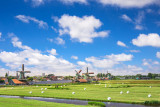
Provincie Noord-Holland heeft in mei 2021 een nieuwe datastrategie in concept vastgesteld. De wereld verandert snel en de strategie uit 2018 sloot steeds minder aan bij de huidige ambities. Het streven is om datatechnologie in te zetten voor optimale resultaten van onze maatschappelijke opgaven.
Hierbij zijn drie elementen van belang. Als eerste ‘duurzaamheid’. Wij willen profiteren van digitalisering op een manier die zo min mogelijk ten koste gaat van natuurlijke hulpbronnen. Het tweede element is ‘transparantie’. Wij zien in transparantie de kans om te innoveren mét het vertrouwen van onze inwoners. Het laatste element is ‘data-soevereiniteit’. Wij zien het als onze verantwoordelijkheid om onze onafhankelijkheid zo veel mogelijk te borgen. En misschien nog wel belangrijker: óók de onafhankelijkheid van de inwoners van Noord-Holland.
Om deze stip op de horizon te bereiken hebben we vier doelstellingen opgesteld:
Doelstelling 1
In 2023 zijn wij beter dan nu in staat om met data de maatschappelijke resultaten van onze opgaven te beschrijven, verklaren, voorspellen of optimaliseren.
Met datatechnologie dragen we bij aan de maatschappelijke resultaten die wij voor onze opgaven willen bereiken. Die resultaten verschillen per opgave. Daarom zullen wij voor elke opgave de datapositie in kaart brengen, zo kunnen we tegemoetkomen aan de specifieke behoeften. Voor een aantal complexe deelopgaven starten we bijvoorbeeld een experiment, waarbij we de mogelijkheden van een ‘digital twin’ onderzoeken.
Doelstelling 2
In 2023 zijn de digitaliseringsbelangen van onze provincie adequaat behartigd op het niveau van de Europese Unie, de Rijksoverheid, de Tweede Kamer en de regio Amsterdam.
Digitalisering en AI vertegenwoordigen een steeds groter economisch en maatschappelijk belang. Zij hebben meer en meer politiek-bestuurlijke aandacht. Zowel op het niveau van de Europese Unie, de Rijksoverheid, de Tweede Kamer als de regio Amsterdam. Dat is relevant voor onze lobby.
Doelstelling 3
In 2023 is meer data van de provincie open en toegankelijk beschikbaar en weten de inwoners van Noord-Holland waar ze deze data kunnen vinden.
Open data is voor de provincie om twee redenen van belang. Allereerst draagt het bij aan transparantie, wat essentieel is voor het vertrouwen van onze inwoners. Daarnaast stelt open data externe partijen, bijvoorbeeld startups, in staat om applicaties te ontwikkelen. Hiervoor richten wij in 2021 een open dataregister in. En hebben wij in 2023 onze meest relevante open datasets gepubliceerd.
Doelstelling 4
In 2023 ervaren inwoners, bedrijven en onze partners dat wij inzet van data en datatechnologie afwegen tegen de Tada-waarden: inclusief, zeggenschap, menselijke maat, legitiem en gecontroleerd, open en transparant, van iedereen - voor iedereen.
We werken vóór onze inwoners en bedrijven. Dus zorgen we dat ons werk met data geen negatieve gevolgen voor hen heeft. Kortom: we gaan verantwoord om met data en datatechnologie. Om dit waar te maken experimenteren we in 2021-2023 met het toepassen van de Tada-waarden en werken we toe naar het publiceren van onze algoritmen in een register. Zo innoveert de provincie Noord-Holland mét het vertrouwen van haar inwoners en bedrijven.
Note van ASC: Wil je nog net iets meer weten? Laat het weten in de comments.
Verbeterde energie-efficiëntie in kantoren door Merin & Spectral

Sinds september 2018 werken vastgoedbelegger Merin en techbedrijf Spectral samen om de huurders van Merin een hoger comfortniveau te bieden tot een verbeterde energie-efficiëntie te komen. De pilotfase ging zo goed - huurders ervaren een beter klimaat en er werd 40% minder gas en 15% minder elektriciteit verbruikt - dat de twee partijen hun samenwerking nu opschalen naar 17 gebouwen.
Comfort is cruciaal
Het verminderen van de CO₂-uitstoot door kantoorgebouwen is een cruciaal onderdeel van de duurzaamheidsdoelstellingen van Merin. De grootste prioriteit is ervoor te zorgen dat het comfort van huurders tijdens dit proces wordt gehandhaafd. Door het plaatsen van extra sensoren die onder andere temperatuur en CO₂ meten, wordt het comfort in het hele gebouw gemonitord. Op basis van die data stuurt de software de klimaatinstallaties actief aan.
Hoe wordt er zoveel bespaard en waardoor wordt het comfort verhoogd?
Door het overnemen van de aansturing van de installaties met de active control-module. Slimme algoritmes optimaliseren het klimaat en voorkomen energieverspilling omdat gas- en elektriciteitsverbruik efficiënter worden. In het Smart Building Platform (SBP) van Spectral komen de beschikbare data(bronnen) van de gebouwen samen. Het platform biedt inzicht in de (duurzaamheids)prestaties voor gebouweigenaren. De software verrijkt die verbruiksdata met weersvoorspellingen, de bezettingsgraad en andere input. Met al deze data stuurt het platform de installaties in de gebouwen op een slimme manier aan en bespaart het elektriciteit en gas zonder kostbare ingrepen. Lees meer..
Mini Docu: 'Transparent Charging Station'

Algorithms are becoming increasingly important. For example, they influence how electricity is distributed amongst car charging stations. But during peak hours, who is allowed to load first and at what speed? And how do you know - as a user - what is happening and if the choices made are fair? To find answers to these questions, the Transparent Charging Station project was started in 2017. A short documentary on this topic has premiered on March 18th 2021.
Documentary 'Transparant Charging Station'
In this short documentary, six experts talk about the origin, development and future of the Transparent Charging Station. The documentary was made possible by Knowledge and Innovation Center ElaadNL, Municipality of Amsterdam, Amsterdam Institute for Advanced Metropolitan Solutions, The Incredible Machine and TU Delft.
With: designer Marcel Schouwenaar, initiator Thijs Turèl, scientist Kars Alfrink, Smart Mobility expert Ruben Polderman, behavioral researcher Lotte Gardien and software engineer Ton Smets.
Metropolitan Mobility Podcast met Maurits van Hövell: van walkietalkies naar het Operationeel Mobiliteitscentrum

“Voorheen werd er gewoon rondgebeld: ‘Wij zitten in de instroom van de ArenA. We hebben nu 20.000 man binnen. Hoe gaat het bij jullie op straat?’” In de achtste aflevering van de serie A Radical Redesign for Amsterdam, spreken Carin ten Hage en Geert Kloppenburg met Maurits van Hövell (Johan Cruijff ArenA). Hoe houdt je een wijk met de drie grootste evenementenlocaties van het land, bereikbaar en veilig? Ze spreken elkaar in het Operationeel Mobiliteitscentrum over de rol van de stad Amsterdam, data delen en het houden van regie. A Radical Redesign for Amsterdam wordt gemaakt in opdracht van de Gemeente Amsterdam.
Luister de podcast hier: http://bit.ly/mvhovell
Smart Health Amsterdam is looking for an intern Communication & Events
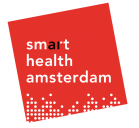
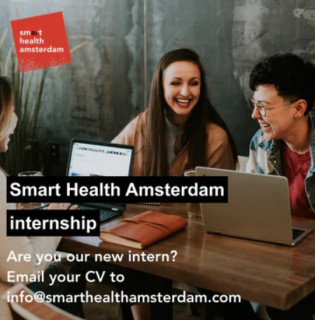
Looking for an internship where you can develop new skills in communications, marketing, PR and event management? Do you have an interest in how AI & data science can contribute to a healthier society and better medical care? Want to work as part of a fun and inspiring team?
As Amsterdam’s key network for data- and AI-driven innovation Smart Health Amsterdam (Gemeente Amsterdam & Amsterdam Economic Board) in #the #life #sciences and #health sector, we’re looking for an intern. Interested? Get in touch today.
https://smarthealthamsterdam.com/p/jobs-at--smart--health--amsterdam Smart
Metropolitan Mobility Podcast: De stad slimmer en schoner van goederen voorzien?
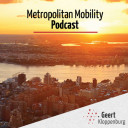
In deze podcast gaat Geert Kloppenburg in gesprek met Walther Ploos van Amstel en Carin ten Hage over digitale voorwaarden voor gezonde stadslogistiek. Luister hier de podcast: http://bit.ly/38ASVZ
Latest developments in the Amsterdam Smart City program
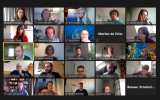
Last December, the 20 partners of Amsterdam Smart City came together to present the progress of innovation projects, ask for input, share dilemmas and involve other partners in their initiatives.
Following the thought that nobody wants to live in a smart city but in a nice, friendly, cosy city we work on challenges in which people play a central role. These gatherings are called Demo days and occur every 8-10 weeks. Get a quick overview of the topics and projects about to happen in the Amsterdam Metropolitan Area and let us know if you want to be involved!
ELSA Lab: AI, Media & Democracy
Pascal Wiggers, senior lecturer Responsible Artificial Intelligence at Amsterdam University of Applied Sciences, is working on an Ethical Legal Societal Aspects Lab to investigate and shape the impact of AI on our society. The University of Applied Sciences is doing this in co-creation together with residents, companies, knowledge institutions and governments. Partners want to understand how AI-driven applications in the media and public space
influence democracy. They also want to experiment with new applications of AI in the media and in the democratic process and draft new ethical and legal guidelines. Pascal is looking for parties that want to join the consortium. Various Amsterdam Smart City partners are interested to join. You too?
Object Detection Kit
Keeping the city streets clean is a major challenge. Maarten Sukel from the City of Amsterdam developed an image recognition system that shows streets in real time maps. For example, garbage bags and other unwanted objects in
the street scene are recognized. The system is based on machine learning and ultimately, we can clean Amsterdam more efficiently and sustainably. The system is continuously improved and tested. In the future it might be used for the recognition of water puddles in the streets, track missing pets, link with a module that shows the value of objects on the streets and more.
Seenons
Seenons believes in a future with 0% residual waste as a standard. Seenons makes it easy to separate waste and then pick it up separately and sustainably. Citizens and companies offer their separate flows via an app, the Seenons platform proposes the optimal route with the best transport options and delivers the residual flows to processors who make new products of them. Seenons also prevents contamination of flows through clear separation and fine-meshed collection. Environmental friendly transport is used, such as cargo bikes.
Mapping of material flows
Maintaining the value of the raw materials was a central topic at this Demoday. Martijn Kamps from Metabolic started with a presentation about recycling of materials. Based on cases in Rotterdam and Philadelphia he showed that there is a lot of construction and demolition waste that is still dumped or burned. This is issue is still not solved because there is too little data available about these materials. According to Metabolic, urban mining can help. A lot information about volumes of waste is available, but there is no business case yet. You can see where flows come from, identify them, decide where you store materials in the meantime and then, where you want to reuse them. The PUMA project was one of the first projects in this field and current projects are all a sequel to PUMA.
Arnout Sabbe from Geofluxus continued. Geofluxus is a startup which originates from REPAIR, a project with Metabolic and AMS Institute, among others. Geofluxus is working on a reclassification model for raw materials. Currently, there are many databases in which raw materials are registered. Geofluxus brings these together as a combination of data sources from industrial waste. In the Geofluxus monitor you can see how p.e. wood from the Amsterdam Metropolitan Area eventually spreads all over the world. It shows the impact on the road network and CO2 emissions for certain waste streams elsewhere. Geofluxus is developing this monitor for the City of Amsterdam and expects to have it ready by the end of next year, although the municipality is dependent on the availability of data. New partnerships are therefore necessary. But a first success is already visible: through the monitor is clear that 70% of the waste in the Amsterdam Metropolitan Area is caused is used by only 7% of companies. A result worth continuing this work and something to hold on to!
Collaboration between governments and innovative companies
In order to innovate we have to work together; governments and innovative companies. That is not always easy. Various organizational cultures and interests collide. Everyone is in their own system and has its own pace. We had an open and honest discussion on this based on two cases. One of the companies started with some positive feedback: the region is at the forefront of circularity, there is a lot of attention and ambition. But collaborating is different. The company experiences a lot of reluctance, especially from governments. There is little willingness to take
responsibility and work outside existing frameworks. In addition, there is an enormous fragmentation of tasks and a fear of explicitly saying yes or no. For the other company this story is recognizable. They experience a lot of enthusiasm about their company, but still it takes a huge amount of time to involve different departments and decision making is very slow. They noted it is time to get out of the pilot sphere and important to mention business models early on.
There was a lot of understanding and recognition from the government side. They recognized the stories about the silos and indicated that it takes a lot of people and time to make decisions. Governments are less likely to think outside the box and both parties must invest in building trust. The advice that came out for both parties: embrace complexity, be persistent, be open to each other, be clear about expectations, go where the energy flows. And as a positive conclusion: once collaboration is there, governments are nice, loyal and reliable partners.
CleanMobileEnergy (CME)
Cenex The Netherlands is in the middle of the development of an intelligent Energy Management System (iEMS), based on three urban pilots in Nottingham (UK), Arnhem (NL) and Schwabisch Gmund (DE). The goal is to develop a transnational and generic iEMS. In these cities, the pilot elements are currently being put out to tender and connected to the iEMS. Cenex would like to know which mobility and energy initiatives could be suitable for integrating in this iEMS.
Sharing Energy in Almere Haven
The City of Almere joined Amsterdam Smart City as a partner and has many great initiatives to share with the network. In 2020 Almere started EARN-E to reduce the use of electricity and gas in people's homes. Next year, Wijkie will be launched: this combines the energy transition with social needs in a neighbourhood. The core is the sharing of energy with your neighbours in your neighbourhood. In order to set up Wijkie successfully, it is important to enter into dialogue with residents.
The Energy Transition Explained
The energy transition is "hot". Much has been reported in the media, but the reporting is not always easy to understand and sometimes even confusing. Knowledge is needed to critically follow the news about the energy transition. That is why Sanne de Boer wrote the book ‘De energietransitie uitgelegd’. The book provides all the basic knowledge needed to follow news and form informed opinions in discussions. Sanne is looking for suggestions for where to market her book to be able to transfer this knowledge.
Curtailment for solar panels
As an energy platform, Vandebron is an innovative player in the field of sustainable energy. They took us along in the story of solar panel curtailment: remotely on and off switching of energy. A well-known phenomenon in the energy world is that the electricity demand is reasonably stable, but due to the volatility of renewable energy there are significant peaks in the electricity supply every year. The result is that the energy grid becomes full due to the surplus of electricity. This creates problems for the grid operator, who is then forced to hand out a fine. In this case, this means a possible fine for Vandebron, who then has to pass it on again to the producer. Nobody is happy about that.
Curtailment could be a solution. Curtailment makes sure that a surplus can be avoided, when solar panels are switched off in time. The central question is: "How to do this effectively?" It is clear that some degree of curtailment is inevitable, but it is also important to determine whether the energy surplus can be reduced in another way. There is still a world to be won with out-of-the-box thinkers on board.
Energy from braking power
The engine of a train or tram is comparable to the dynamo of a bicycle. In addition to powering the train, the motor is also able to generate energy. This happens, for example, during braking. How can we return the energy that is generated to the grid? And what are the options to apply this in neighbourhood hubs? Arcadis told us that energy generated with the brake of a train, can provide an average household with energy for 2.5 weeks.
This offers a lot of opportunities. Braking energy can be deployed immediately in your own system, it can be stored and then deployed, it can be made available to other parties via neighbourhood hubs. And there is more. Suggestions at that popped up at the demoday: returning energy to grid operators, making a link with buses, ferries and taxis, supplying shops at the station, neighbourhood batteries. To get a step further, possible obstacles have to be overcome as well of course. Experts will work on technological challenges and the saving of a lot of energy in a short time among others. In January, Arcadis, the City of Amsterdam, AMS Institute and Alliander will continue working on this topic. Interested? Then contact us.
Future Fitness Garden
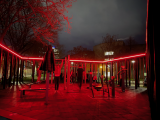
Getting fit and healthy again in 2021? Since the citywide lockdown, members of local sport-clubs have been forced outdoors. One of the most popular (outdoor) fitness areas on the Amsterdam waterfront has been the Marineterrein. In our latest project “Future Fitness Garden” we explore how smart lighting can remind us of safe distancing and capacity in public space during Corona.
Using algorithms we can anonymously detect proximity and density of people working out. For example if they come within 1,5 meters to one another the LED strips turn BLUE. If there are too many people occupying the area the LED will turn RED. This system gently reminds guests to respect each other’s space while sharing the future fitness garden.
Thanks to project partners Marineterrein Amsterdam. Compliments to AI genius Markus Pfundstein, Electrical Mechanical Wizard Werner Pfundstein
Looking for partners on Inclusive and AI
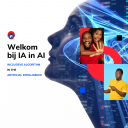
With Inclusive Algorithm, we would like to bring more inclusion and diversity in Artificial Intelligence revolution and business.
Our main objective is to generate more network and knowledge in the Artificial Intelligence field to better understand how artificial intelligence, algorithms and big data can be ethically developed for societal benefit by involving the marginalized groups (groups with migrant backgrounds & bi-culturals).
We just started this initiative and we are building alliances with people believing in our cause. Please feel welcome to reach out if you think we can add value to the work you do or vice versa.
Cleaner en cheaper charging EV with realtime energyprices

Normally, people come home from work and charge their EV immediately. Current grid
systems can handle these new flows in power hardly. Smart Charging means that
you postpone EV charging to timeslots with lower demand. This stabilize the grid
and the EV owner can charge at lower, and even negative prices.
Edmij, together with Sensoria, developed a way to charge at realtime power prices per
quarter of an hour. At September 25th, they initially postpone charging and
starts charging at times with negative prices. Balancing the grid with smart
charging brings benefits to the EV owner and the grid operator: a win-win!
MozFest's Call for Session Proposals is OPEN!

MozFest is a unique hybrid: part art, tech and society convening, part maker festival, and the premiere gathering for activists in diverse global movements fighting for a more humane digital world.
That’s why I’m excited to invite you and your community to participate in the first-ever virtual MozFest! There will also be a local taster event in Amsterdam.
Submit A Session Idea for MozFest This Year: mzl.la/proposals2021
We’re excited to use the programming that we’ve honed over a decade of festivals – participant-led sessions, immersive art exhibits, space for spontaneous conversations, inspiring Dialogues & Debates – to address current and global crises. Through our Call for Session Proposals (where you're invited to propose an interactive workshop to host at the festival), we’ll seek solutions together, through the lens of trustworthy artificial intelligence.
Anyone can submit a session – you don’t need any particular expertise, just a great project or idea and the desire to collaborate and learn from festival participants.
If you or someone you know is interested in leading a session at MozFest this year, you can submit your session idea here! The deadline is November 23.
Details and submission page: mzl.la/proposals2021
Stay up to date
Get notified about new updates, opportunities or events that match your interests.

